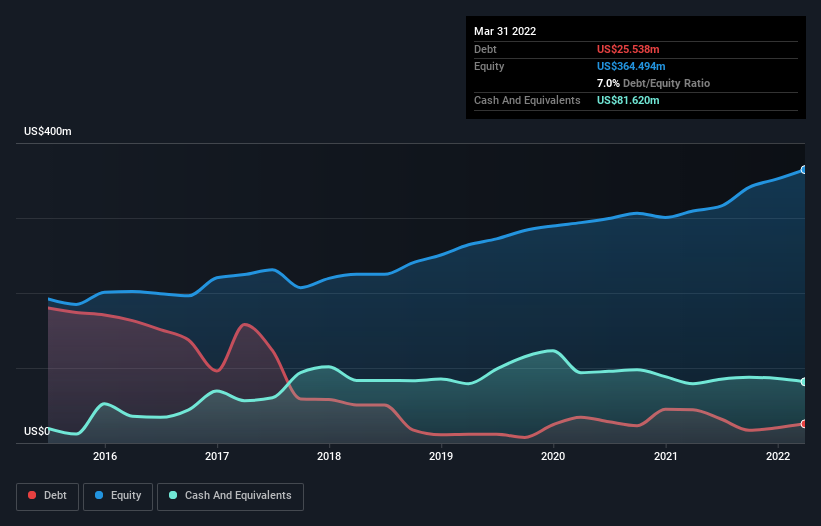
David Iben put it well when he said, 'Volatility is not a risk we care about. What we care about is avoiding the permanent loss of capital.' It's only natural to consider a company's balance sheet when you examine how risky it is, since debt is often involved when a business collapses. We note that NACCO Industries, Inc. (NYSE:NC) does have debt on its balance sheet. But the more important question is: how much risk is that debt creating?
Why Does Debt Bring Risk?
Debt and other liabilities become risky for a business when it cannot easily fulfill those obligations, either with free cash flow or by raising capital at an attractive price. If things get really bad, the lenders can take control of the business. However, a more frequent (but still costly) occurrence is where a company must issue shares at bargain-basement prices, permanently diluting shareholders, just to shore up its balance sheet. By replacing dilution, though, debt can be an extremely good tool for businesses that need capital to invest in growth at high rates of return. When we think about a company's use of debt, we first look at cash and debt together.
View our latest analysis for NACCO Industries
How Much Debt Does NACCO Industries Carry?
As you can see below, NACCO Industries had US$25.5m of debt at March 2022, down from US$44.4m a year prior. But on the other hand it also has US$81.6m in cash, leading to a US$56.1m net cash position.

How Healthy Is NACCO Industries' Balance Sheet?
The latest balance sheet data shows that NACCO Industries had liabilities of US$36.4m due within a year, and liabilities of US$112.1m falling due after that. Offsetting this, it had US$81.6m in cash and US$45.6m in receivables that were due within 12 months. So it has liabilities totalling US$21.3m more than its cash and near-term receivables, combined.
Since publicly traded NACCO Industries shares are worth a total of US$380.6m, it seems unlikely that this level of liabilities would be a major threat. However, we do think it is worth keeping an eye on its balance sheet strength, as it may change over time. While it does have liabilities worth noting, NACCO Industries also has more cash than debt, so we're pretty confident it can manage its debt safely. There's no doubt that we learn most about debt from the balance sheet. But you can't view debt in total isolation; since NACCO Industries will need earnings to service that debt. So when considering debt, it's definitely worth looking at the earnings trend. Click here for an interactive snapshot.
Over 12 months, NACCO Industries reported revenue of US$202m, which is a gain of 48%, although it did not report any earnings before interest and tax. Shareholders probably have their fingers crossed that it can grow its way to profits.
So How Risky Is NACCO Industries?
While NACCO Industries lost money on an earnings before interest and tax (EBIT) level, it actually booked a paper profit of US$52m. So taking that on face value, and considering the cash, we don't think its very risky in the near term. The good news for NACCO Industries shareholders is that its revenue growth is strong, making it easier to raise capital if need be. But we still think it's somewhat risky. There's no doubt that we learn most about debt from the balance sheet. However, not all investment risk resides within the balance sheet - far from it. For example - NACCO Industries has 4 warning signs we think you should be aware of.
Of course, if you're the type of investor who prefers buying stocks without the burden of debt, then don't hesitate to discover our exclusive list of net cash growth stocks, today.
Valuation is complex, but we're here to simplify it.
Discover if NACCO Industries might be undervalued or overvalued with our detailed analysis, featuring fair value estimates, potential risks, dividends, insider trades, and its financial condition.
Access Free AnalysisHave feedback on this article? Concerned about the content? Get in touch with us directly. Alternatively, email editorial-team (at) simplywallst.com.
This article by Simply Wall St is general in nature. We provide commentary based on historical data and analyst forecasts only using an unbiased methodology and our articles are not intended to be financial advice. It does not constitute a recommendation to buy or sell any stock, and does not take account of your objectives, or your financial situation. We aim to bring you long-term focused analysis driven by fundamental data. Note that our analysis may not factor in the latest price-sensitive company announcements or qualitative material. Simply Wall St has no position in any stocks mentioned.
About NYSE:NC
Adequate balance sheet low.
Similar Companies
Market Insights
Community Narratives




